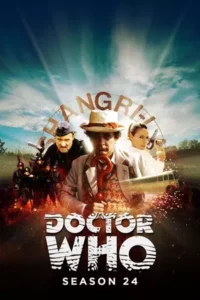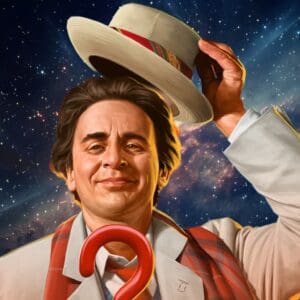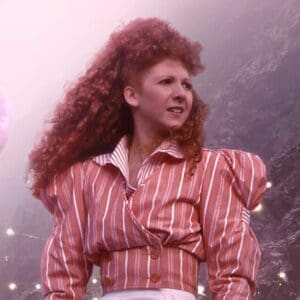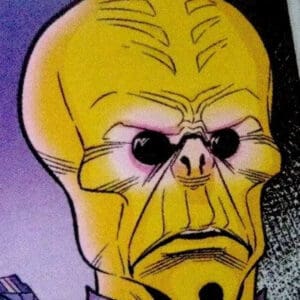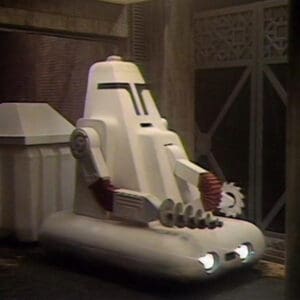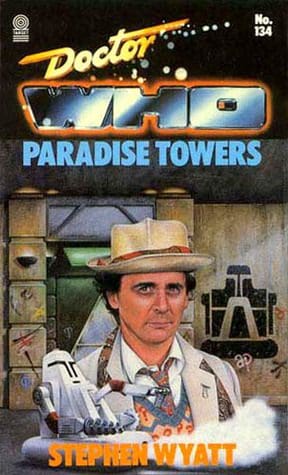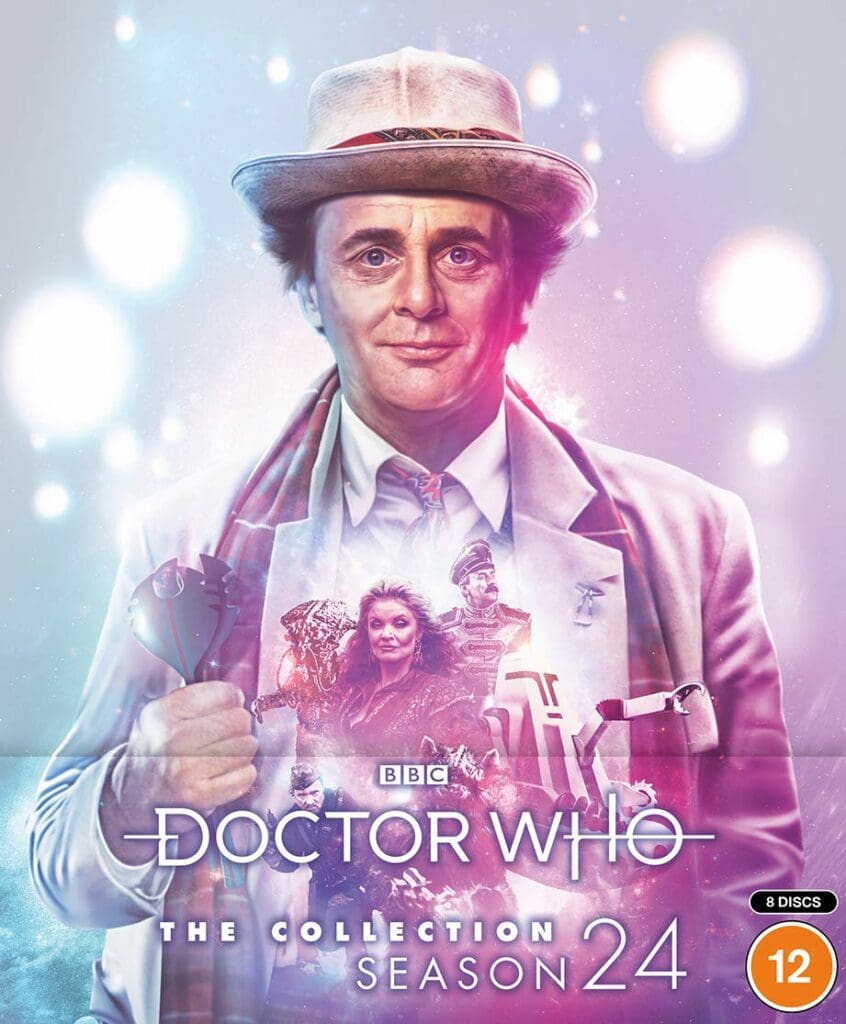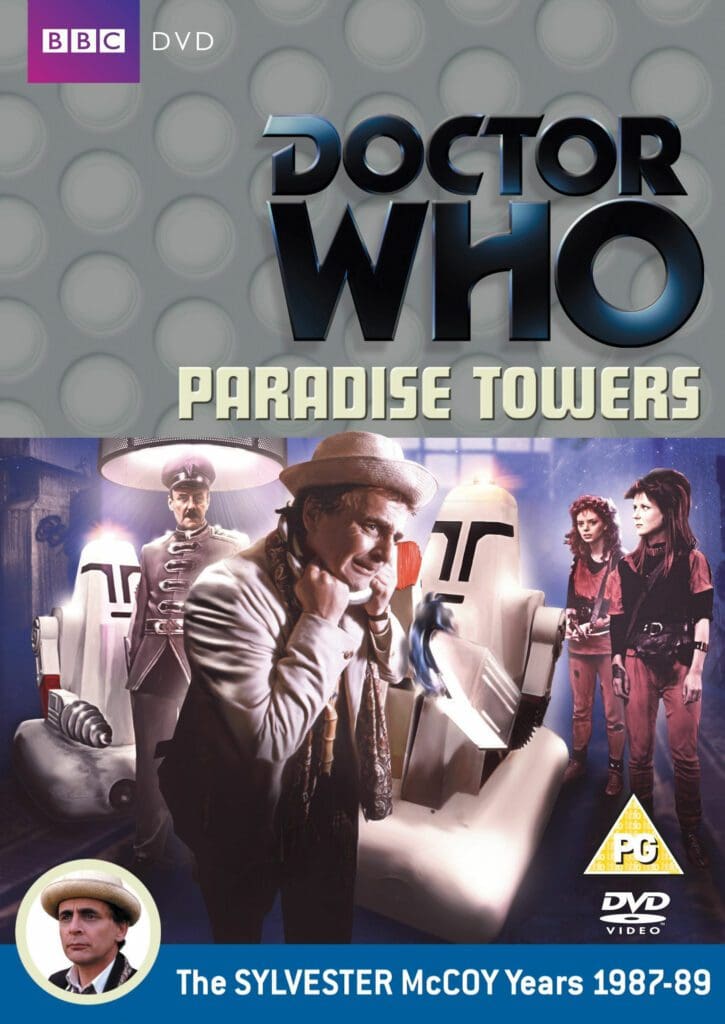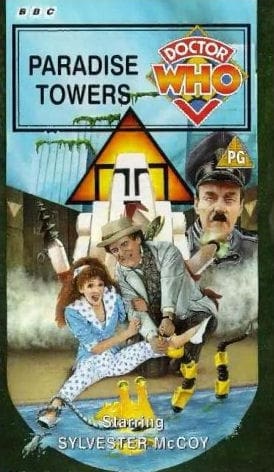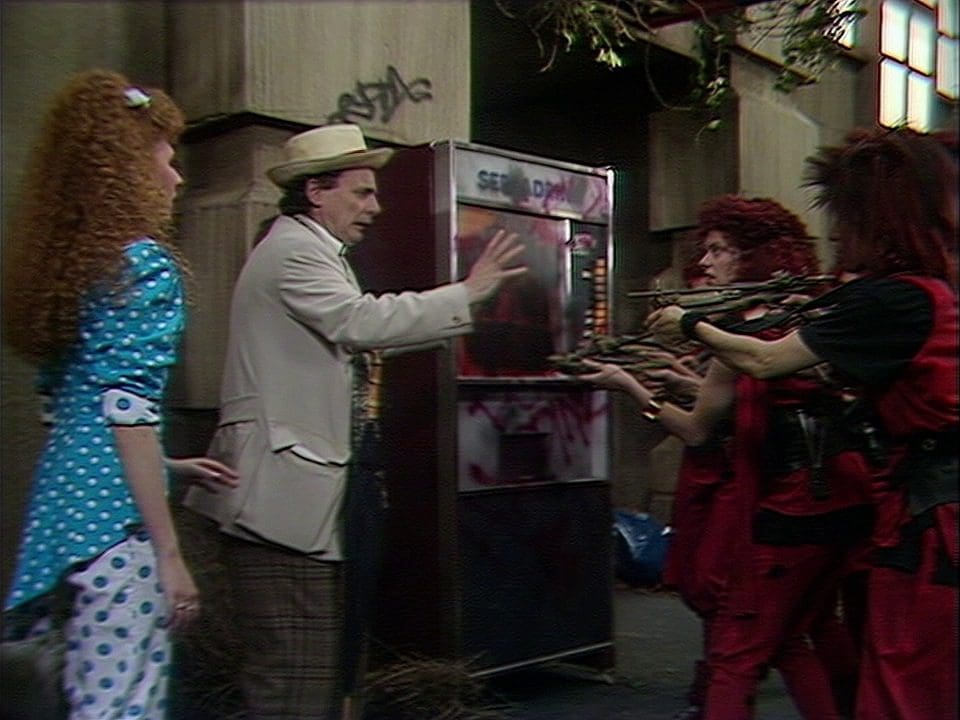
Classic Who S24 • Serial 2 · (4 episodes)
Paradise Towers
Reviews and links from the Community
Review of Paradise Towers by Bongo50
In my opinion, Paradise Towers is an ice hot serial! I really like the way it manages to construct its setting in a natural yet detailed way throughout the four episodes. The worldbuilding is probably my favourite bit. The slang made up for the story feels realistic to me (and some of it has even entered modern usage, like "unalived", which I'm not saying is a good thing but it is somewhat interesting). I also think that the plot is largely solid with a cool concept and lots of nice suspense. The sets and costumes also look excellent, and I love the score! I also find it quite funny, and I think that it's a great introduction to the Seventh Doctor's character (Time and the Rani doesn't count...). The main critisism I have is that some aspects of the plot don't seem to make total sense to me.
This review contains spoilers
Review of Paradise Towers by WeAreInACar
Despite being targeted at younger viewers, there's a lot here for everyone and much more depth than initially meets the eyes.
Considering when this was written and filmed, the thinking about the show at the BBC back then, and the meagre funding; the finished product is amazing. A set with multiple levels and a cleaner robot that travels smoother than K9 ever has.
There is a wealth of ideas in the script, even 'gang language' that makes you cringe but, then again, the expressions we used to say when I was young do the same. They add a depth to this world.
Elizabeth Spriggs shines in particular.
I love the idea of a scared hero (subverting the stereotype and opposite to the Doctor). Weirdly I found the bullying more unpleasant than the cannibalism!
The story isn't perfect:
- why doesn't anyone simply leave?
- I appreciate why the women in the gangs are women and not the children I imagine they were in the script, but it would work far better with teenagers and I struggled to suspend my belief about this,
- The Great Architect in the basement is underwhelming, and
- Richard Briars choice of character/s is... curious
but the story is a fun ride at a good pace.
Review of Paradise Towers by sircarolyn
Paradise Towers is brilliant. It's silly but it's actually good and I have no idea what haters are talking about.
This review contains spoilers
Review of Paradise Towers by SophieScarlet
It's interesting that this episode is regarded as being so reviled when it has a rather middling score here. Perhaps it's just polarizing.
I quite enjoyed it, and I think the worst you can say about it is it doesn't live up to its potential thanks to the budget. If this story had appeared in NuWho, with plenty of extras to fill out the Rezzies, sets that looked like they'd faded from glory rather than being unfinished, and Cleaners that didn't look like milk jugs with Sharpie (no, the Dalek method of creating an iconic monster did not work this time), it would absolutely slap. Actually, having said that, if we'd gotten a remake of this with Nine and Rose, society would be cured.
I guess there is one other problem, which is that for the third story in a row, the plot makes less sense the more you think about it. For instance, it must have been a long time since the war for the people's language to have evolved the way it has, but unlike the Sevateem or the villagers in State of Decay, these characters seem to be the same ones who were originally sheltered in the Towers (unless the Kangs can reproduce asexually!).
But there's a lot to enjoy here. The interesting angle on a post-apocalyptic setting, the Rezzies' delightful acting, "The quest is the quest"-esque mantras like "Build high for happiness," and Mel once again proving herself as entirely capable on her own, when she's not screaming. The Kangs' hand jive ought to be a staple of fandom! And it's a good adventure with a worthy setup; it really is just the details that let the story down.
This review contains spoilers
Review of Paradise Towers by Napp
By 1987, Doctor Who had been ridiculed by BBC Big Boy Michael Grade, seen a slump in ratings, put on hiatus for 18 months and rescheduled during the week (as opposed to Saturday) opposite the then most popular show on TV. Despite this, an increasingly isolated JNT strove to make the show the best way he could, and new Script Editor Andrew Cartmel represented a vital shot of new blood it needed. No more over-reliance on past monsters and past glories, Cartmel brought with him a new gang of instinctive writers and a whole new direction for the show - and after initial concerns, the producer was content to let him go his own way.
We had new music composers, a new computer-generated title sequence and a bizarre new Doctor. Sylvester McCoy's first story was a chaotic runaround commissioned before the script editor's arrival. His second, Paradise Towers, saw the Cartmel Masterplan reach fruition.
Firstly - what a cast! Richard Briers, Clive Merrison, Judy Cornwell, Elizabeth Spriggs and Brenda Bruce join a slew of new faces Howard Cooke, Catherine Cusack (Mark Strickson's wife at the time) and my personal favourite, the exotic Annabel Yuresha. That they all decided, or were directed, to give heightened performances elevated this darkly curious drama into a kind of comic strip territory that not all viewers took to. Me? I loved it then and love it now. Doctor Who is a fantasy, and if occasionally the characters become caricatures of that, then that's fine with me. The biggest 'culprit' is Briers, a real name at the time, who refused to tone down his 'possessed' acting. It's too much, of course, but could have been made decidedly spooky if he was given some cadaverous make-up, or perhaps his voice had been synthetically treated to give it a disembodied quality instead of relying entirely on Brier's admittedly broad performance.
The script is, I think, very clever. Paradise Towers could have been terrifying, with the Rezzies screeching old hags, and the caretakers genuinely psychotic, ungovernable thugs - but that's not what Doctor Who was about in 1987. And so, the darker elements of the story were given 'family-friendly' production values, and the comedy of the characters was brought to the fore. Richard Snell, the original composer had his music jettisoned for being too gloomy, with new regular Keff McCulloch brought in at the eleventh hour. The result is a pleasing mix of surreality and gruesome body horror - although naturally, we don't see anything remotely bloody.
Little touches, like Sylvester's improvised raising of his hat to a stationary piece of architecture book-ending the action, and the scrawling of 'Pex Lives' on the wall behind the dematerialising TARDIS at the end reminds us of the charming attention to detail that Doctor Who still boasted, even at a time when viewers and fans appeared to take against it.
My only problem involves the character of Pex, played so straight by Howard Cooke. A coward by nature eager to prove his worthiness, he's encouraged by all to ultimately confront the enigmatic villain Kroagnon. He does so, and is killed as a result. The message seems to be that the only way 'cowardly cutlet' can prove he's not a coward is by sacrificing himself. Even lovely Mel looks on proudly as Pex returns to the climactic action and subsequently, his death. They all mourn him at the end, but they all encouraged him in the first place! A bit of tweaking of the script to alter those final moments would have helped, I think.
Other than that, I love Paradise Towers. After 24 years, Doctor Who was building itself up once again, but in a manner that hadn't been seen before. The Cartmel Masterplan would return in Series 25 with stories that had even the most ardent complainers admitting that perhaps ... just perhaps ... this new version of their favourite show was actually still pretty good.
My score is 4 out of 5.
This review contains spoilers
Review of Paradise Towers by WhoPotterVian
Paradise Towers is one of those stories that is often ridiculed by the Whovian fanbase - and it's not hard to see why. But I'll come to that later. The story was the result of a falling out between producer John Nathan Turner and script editor Eric Saward; John Nathan Turner was determined to find a writer who had never worked on the show before. He came across writer Stephen Wyatt at the BBC's script unit and asked him to submit a story for the show. That story was, of course, Paradise Towers.
Paradise Towers starts with the Doctor (Sylvester McCoy) and Mel (Bonnie Langford) planning to visit a luxurious residential complex called Paradise Towers. Mel watches a promotional video for the towers that shows it as a beautiful complex, complete with a massive swimming pool. However when they arrive, they find it in a state of disrepair. The residents have become primitive tribes with no idea what a vending machine is and the place is run by the Caretakers; a group of people who keep surveillance on the towers and worship 'the Great Architect'. Their boss, the Chief Caretaker (Richard Briers) is secretly feeding the population of the Towers to the robotic Cleaners and the 'Great Architect' himself.
The premise of a luxury complex becoming run down to the point where it creates a tribal civilisation is a strong one that unfortunately doesn't follow through. The performances are too over the top to be taken seriously, especially those by the Red Kangs and Blue Kangs. The teenage actors who play the Red and Blue Kangs are annoying and come across as though they are in an amateur theatre production of Doctor Who rather than young professional actors. Many complain about Richard Briers but I actually didn't mind him so much; he at least seems like he belongs in a Doctor Who story. Perhaps he went too far when the 'Great Architect' (otherwise known as 'Kroagnon') possessed the Chief Caretaker's body but in my view if anybody can be accused as too camp the real culprits are Tabby (Elizabeth Spriggs) and Tilda (Brenda Bruce). I found myself rolling my eyes at every one of their scenes; they are too over the top as the stereotypical 'sweet old ladies'. Even when they reveal their real nasty intentions they still continue to ham it up.
The mention of these two ladies brings me onto my next point: Mel is too gullible. She meets Tabby and Tilda once in the story and already she trusts them when they offer to give her tea and cake. Had she never learnt when she was little not to talk to strangers? Even so, you would have thought travelling with the Doctor would have opened her eyes a bit not to be tricked so easily by offerings of food and drink. If I were in an unfamiliar environment and two old ladies randomly invited me round for a cup of tea and cake, flowering me with praise despite it being the first meeting I would be more than a little suspicious of what they were up to. Yet Mel acts as if it's normal.
But it's not only Mel who acts like an idiot in this story: the caretakers are pretty stupid too. The seventh Doctor may be the king of manipulation but it doesn't take him much to manipulate them to let him go when they're holding him prisoner. He literally takes their rule book (basically a book of the law of Paradise Towers) and fabricates rules up that say 'After you have been guarding the condemned prisoner for 30 minutes, you must stand up...move five paces away from the prisoner...close their eyes...put their hands above their head...for a minute and a half'. They don't even bother to snatch the rule book from the Doctor and check it themselves.
This all leads to the story feeling devoid of danger and peril. The caretakers pose no threat to the Doctor precisely because they are bone-dead stupid. Even the cast of The Only Way Is Essex would do a better job of guarding a prisoner for execution than these lot. Even the crab toy that attacks Mel in the swimming pool doesn't pose much of a threat. It just grabs her whilst she frails around in the water screaming. In the time it takes for Pex (Howard Cooke) to chuck her his weapon, it could have ripped her legs off or done something equally as horrifying. But no: instead it just holds her legs.
As for Pex, this character can be summed up in two words: useless and annoying. Pretty much every time he is onscreen they remind you that he's a coward yet when it gets to the pool gathering near the beginning of episode four all of a sudden we are supposed to sympathise with him when the Kangs call him a 'cowardly custard'. Well, sorry Paradise Towers: I may love Doctor Who but you have to earn the right for me to care about a character being called a 'coward'. He quite simply deserves it. Pex makes Mel look brave in comparison and she was never one of the Doctor's bravest companions (even if I personally don't mind her). There's an odd moment in the serial where Mel congratulates him for saving her but he doesn't even do anything. One of the Cleaners takes the old ladies instead. Why not give credit to the Cleaners instead?
The Cleaners are the literal heroes of this otherwise bad story, in the sense that they are the only good thing about it. I like the Cleaners a lot; their design is the kind of satiric look that the story of Paradise Towers should have had. The idea of evil cleaning robots in a tower block that's supposed to be a paradise is nicely ironic by Stephen Wyatt and their scenes are generally better directed by Nicholas Mallett (especially the scene where one of the Cleaner's hands comes through a rubbish chute and pulls one of the old ladies down).
The rest of the direction falls flat, as if Nicholas Mallett didn't know what to do with the story either. The Cleaners are pretty much the only enemies here that feel like they are a danger to the characters of the story. Funnily enough, for robots that don't communicate and are basically just serviceable machines they are probably the most intelligent characters in the story bar the Doctor.
Overall, Paradise Towers is probably Doctor Who's biggest missed opportunity. It has a strong premise that is woefully executed with over the top acting and dumb characters who make Kevin from the 2016 Ghostbusters movie look like a genius in comparison.
The story as a result of the Caretakers' dim behaviour has a lack of danger and peril; only the Cleaners seem remotely menacing in this story. Sylvester McCoy and Bonnie Langford clearly try their hardest to sell this story and neither are to blame for Paradise Towers' failings; both give good performances as the Doctor and Mel but it's not enough to save the story when you have strange scenes that hail cowardly Pex a 'hero' and make Mel come across as way too gullible than she has any right to be. Paradise Towers is definitely a Doctor Who story you should skip, unless you want to deafen yourself with the Kangs' awful shouting.
Review of Paradise Towers by greenLetterT
Paradise Towers has an average of 3.44 stars out of 5 because some people have no appreciation for camp. Yes, the central antagonist is a bit weak, yes the evil monsters aren't all that threatening, yes absolutely everybody is hamming it up with their acting, that's part of the joy of Paradise Towers. I enjoy the world created and the people in it, the Seventh Doctor as a character is finding his feet after a rocky start in Time and the Rani, but more than anything?, this is just an immensely fun serial
This review contains spoilers
Review of Paradise Towers by dema1020
I had actually been recommended Paradise Towers rather warmly by a few that disagree with the more common sentiment around these episodes, and I have to say, after finally seeing these myself after putting it off for some time, yeah, this was just alright. I can see how it is a bit polarizing in the ratings and the story definitely stretches credulity and even the patience of viewers, but I had fun with this for what it is.
This is a very goofy series of adventures, but I found the quirky cast really live up to the nature of the setting and was never really put off by anything. The effects weren't great but you can tell that people were having fun making this. It's interesting that JNT was apparently unhappy with Richard Briers' performance, but I would argue that it is a good example of the actor kind of understanding this material didn't work taken seriously. The cannibal ladies were a riot but they are never going to be a serious menace, so you might as well have fun with something like Paradise Towers and yeah, I think they more or less achieved just that.
I could have done without the girl gangs though, and little decisions in the production along with some pretty clear budget issues very much hold back what could have been McCoy's first great story. The monster was clearly tacked on and it is a shame because the story could have been more original and distinct without the rather underwhelming cleaners. You can definitely tell, especially with how they talk about things behind the scenes, that the crew was quickly adapting to the Seventh Doctor, which would lead to the greatness to come with this character; for that reason, I do struggle to fully fault Paradise Towers. It's one of those things worth watching at least once and it does have its moments. There's a clear and obvious sense of improvement over Time and the Rani.
This review contains spoilers
Review of Paradise Towers by 15thDoctor
My love for the style, tone and production of this era gives my opinion of any story a little boost. My love for the lead actor is stronger than any since Tom Baker. Patrick, Tom and Sylvester are my Doctor Who heroes up to this point - they are what make the show essential viewing.
The robots and main architect villain are the primary elements holding this story back from its full potential. Given how imaginative the world building is elsewhere in the story, with the Kangs, residents and Pecks it would have been exciting if they’d managed to work out a villain that felt like it belonged in the same universe.
Some of the concepts work particularly well. The idea behind the towers themselves, an idyllic home which has been turned on its head, that the baddies work their way up, floor by floor killing anyone in their wake, is a very good one. The killer grannies are good value too. The monster hiding in the swimming pool is far less effective.
There never feels like there's quite enough plot to go round across the four episodes, I wonder if this should have been one of the three part stories in season 24. Or maybe they could have used the space in the story to build out Mel’s character a bit. Bonnie is doing a decent job with what she’s given but it’s a shame she’s never gotten a proper introduction.
Community Ratings
(Updates coming soon:)
Add the last X members who rated it here
Add number of Favs, and who they are, here
